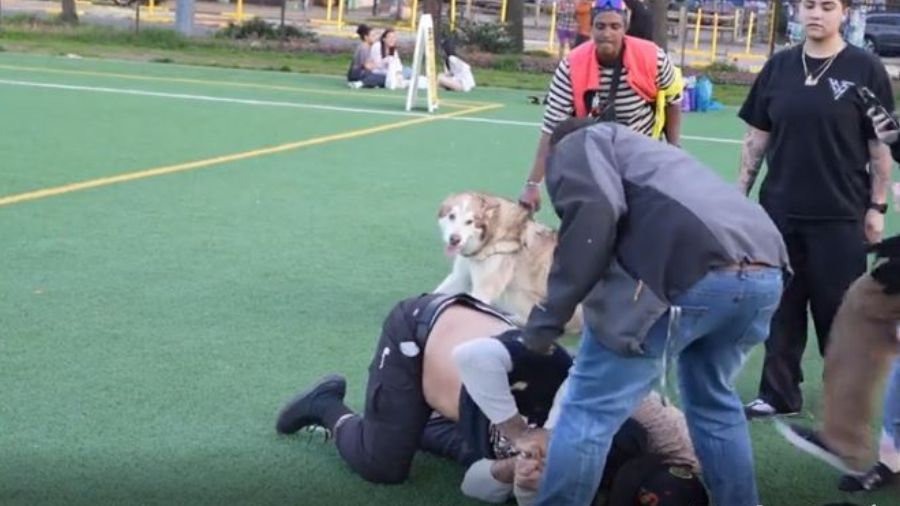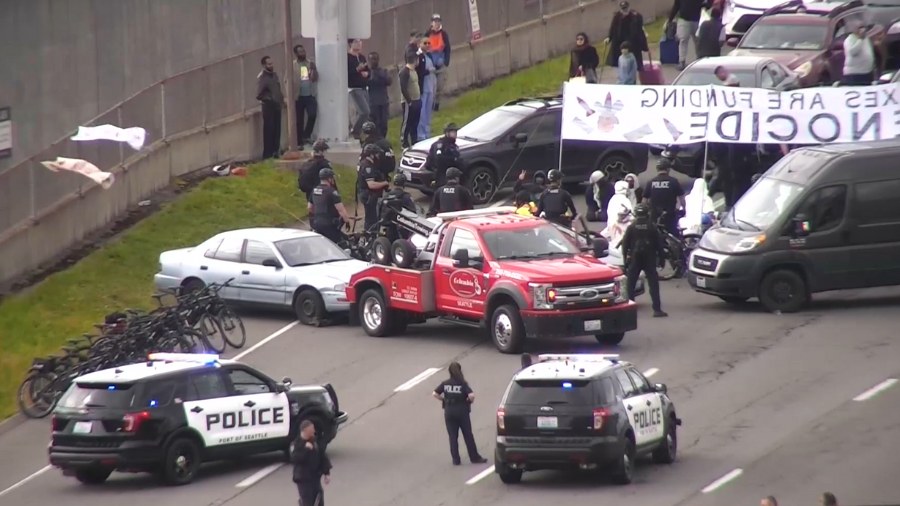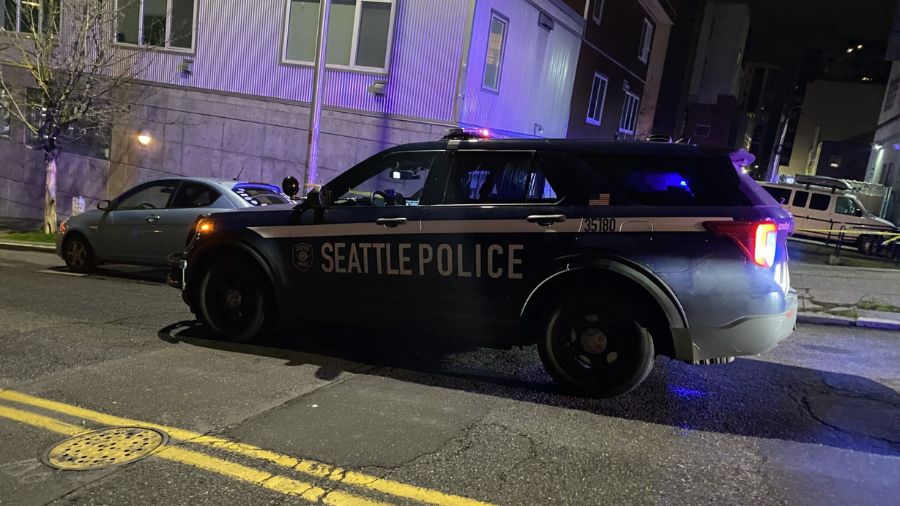Virologist answers our COVID-19 vaccine questions
Dec 29, 2020, 1:38 PM | Updated: Dec 30, 2020, 10:10 am

Gen. Robert B. Abrams, Commanding General for United States Forces Korea, receives a dose of the Moderna COVID-19 vaccine at Brian D. Allgood Army Community Hospital, U.S. Army Garrison Humphreys on December 29, 2020 in Pyeongtaek, South Korea. (Photo by United States Forces Korea via Getty Images)
(Photo by United States Forces Korea via Getty Images)
If you’ve been on Facebook or Twitter in the past two weeks, you’ve likely seen photos of doctors and nurses telling their family and friends about their experience receiving the COVID-19 vaccine.
Virologist Dr. Angela Rasmussen told the Gee & Ursula Show on KIRO Radio on Tuesday that it’s been frustrating to hear people spread myths about the COVID-19 vaccine. She said it’s typical information that people who are anti-vaccines in general are applying to this new vaccine.
“It feels sometimes like trying to use an umbrella to stop a fire hose,” Rasmussen said. “There is so much misinformation that just gets amplified, especially on social media, that it really does feel like a constant struggle to try to push back against all of it.”
That said, Rasmussen acknowledges that people do have legitimate concerns about the process that these new vaccines went through, transparency with some of the manufactures, and the federal government’s role in communicating the science and public health. She said she and her colleagues feel responsible to address each one of those concerns in a respectful matter.
“The goal here, ultimately, is for as many as possible to get vaccinated so that we can go back to some semblance of a normal life for all of us,” Rasmussen said.
The Gee and Ursula Show peppered Dr. Rasmussen with common questions about the COVID vaccine.
COVID-19 vaccine side effects
Some of the first people to get vaccinated have reported intense side effects.
“There are a number of people who’ve gotten the Pfizer or Moderna vaccine who have reported very mild side effects,” Rasmussen explained. “Some people in clinical trials or who have received the vaccine now — they do have side effects that are on the side of more intense. These are typical side effects that happen with many vaccines. It just seems that there is a bit of a higher rate with this particular type of vaccination. Those are things like flu-like symptoms — malaise, fatigue, tiredness, headaches, and mild fever that goes away.”
Rasmussen said experiencing side effects doesn’t mean that you’re getting COVID. It actually means that the vaccine is working to stimulate a robust immune response. She said that if you’re able, you might consider taking a day off work when you get vaccinated.
Do I really need a second dose?
What if people give up after the first dose of the Pfizer or Moderna vaccine and don’t return three weeks later for the second dose?
“We don’t really know what will happen if that does occur,” Rasmussen said. “Oftentimes, when vaccines are in multiple-dose regimes there is attrition where people just don’t go back for subsequent shots. So we’ll see, I guess, what happens to those folks. There was some encouraging data submitted to the FDA for both of these vaccines that shows that one shot offers some partial protection, though it’s not as efficacious as if you get both shots.”
Does the vaccine prevent transmission?
Does getting the vaccine mean that you can’t get COVID and that you can’t spread COVID?
“Unfortunately, the answer is still pretty simple. We don’t know that. However, my suspicion would be that if this is offering some protection against symptomatic COVID-19, which is what the trials looked at, then it’s also offering some protection or at least partial protection against both infection and transmission,” Rasmussen said. “But again, because the trials only looked at its ability to protect against symptomatic COVID-19 and not asymptomatic infection, is that we don’t know. But that is something that both Pfizer and Moderna are looking into with great interest because obviously cutting transmission, especially, has huge implications.”
However, the doctor and state health departments are asking people who have been vaccinated to continue social distancing, washing hands, and wearing face coverings.
Do I need a shot if I already had COVID?
What if you’ve already had COVID-19? Do you need to get vaccinated?
“You should,” she said. “A number of frontline health care workers who definitely had COVID or are COVID survivors have gotten the vaccine since then. The main reason for that is … we know that natural infection induces an immune protection, we know that it induces antibodies in people, but we don’t know how long that protection lasts. We don’t know how long those antibodies will last. To be on the safe side, everybody is recommended to get the vaccine.”
Additionally, Rasmussen said it’s also still unclear about how long the vaccine will last. She said that’s one of the sacrifices made in the expedited nature of creating, testing, and approving the COVID-19 vaccine. However, subjects in early Phase 1 and 2 trials are still showing protection, which is a good sign that it lasts for at least several months. It’s not known if the COVID-19 vaccine will have to be updated annually like a flu shot.
The new COVID variant
Scientists are currently testing the vaccines against a new variant of the virus seen across the United Kingdom, South Africa, and now in Canada.
“There are eight different mutations in the spike protein, which is what the vaccines target,” Rasmussen explained. “The good news so far is the little bit of preliminary data that we have suggests at least one of those mutations won’t affect anything about the vaccine. Personally, I’d be surprised if eight mutations alone were enough to completely evade vaccine induced immunity.”
Is the vaccine safe? It feels rushed
Another common misconception Rasmussen is hearing is that the vaccines were rushed through and they haven’t been evaluated as well as a typical vaccine would be.
“That’s true about durability, but in terms of safety and at least short-term efficacy, they’ve gone through essentially the same process that vaccines normally go through,” Rasmussen said. “They haven’t been pushed through trials that have been under-powered — all of these clinical trials so far have used tens of thousands of participants to make this judgment on safety and efficacy. Those people are continuing to participate in the trials, so they’re going to continue to see how the vaccines affect participants over the long-term.”
COVID-19 vaccines are RNA vaccines
Rasmussen went on to explain that the Pfizer and Moderna vaccine are RNA vaccines and their differences have to do with the lipids they use and the modifications to mRNA. But they’re fundamentally the same.
If you’re looking for a more in-depth explanation of how RNA vaccines work, Dr. Deborah Fuller, a vaccinologist and microbiology professor at the University of Washington School of Medicine, answers those questions in Right As Rain, a UW Medicine publication.
“They’re similar to recombinant protein vaccines, but rather than taking that genetic code and using cells to make that protein in the lab, you take the genetic code and you put it right into people,” Fuller told Right As Rain. “Your own cells then make the protein, and you essentially have your own body make the vaccine.”
Fuller has been working on RNA and DNA vaccines since the late 1980s. She said they’re using RNA vaccine against COVID-19 because they’re much faster to produce.
“RNA vaccines are the perfect rapid-response vaccine to pandemics because, unlike traditional vaccines, all you need is the genetic code,” Fuller said. “The code for SARS-CoV-2 was revealed in early January, and it only took a few days to generate a candidate RNA vaccine that could be tested and prepared for clinical trials.”
Fuller goes on here to explain what you might experience if you get the COVID-19 vaccine.
Listen to the Gee and Ursula Show weekday mornings from 9 a.m. – 12 p.m. on KIRO Radio, 97.3 FM. Subscribe to the podcast here.













